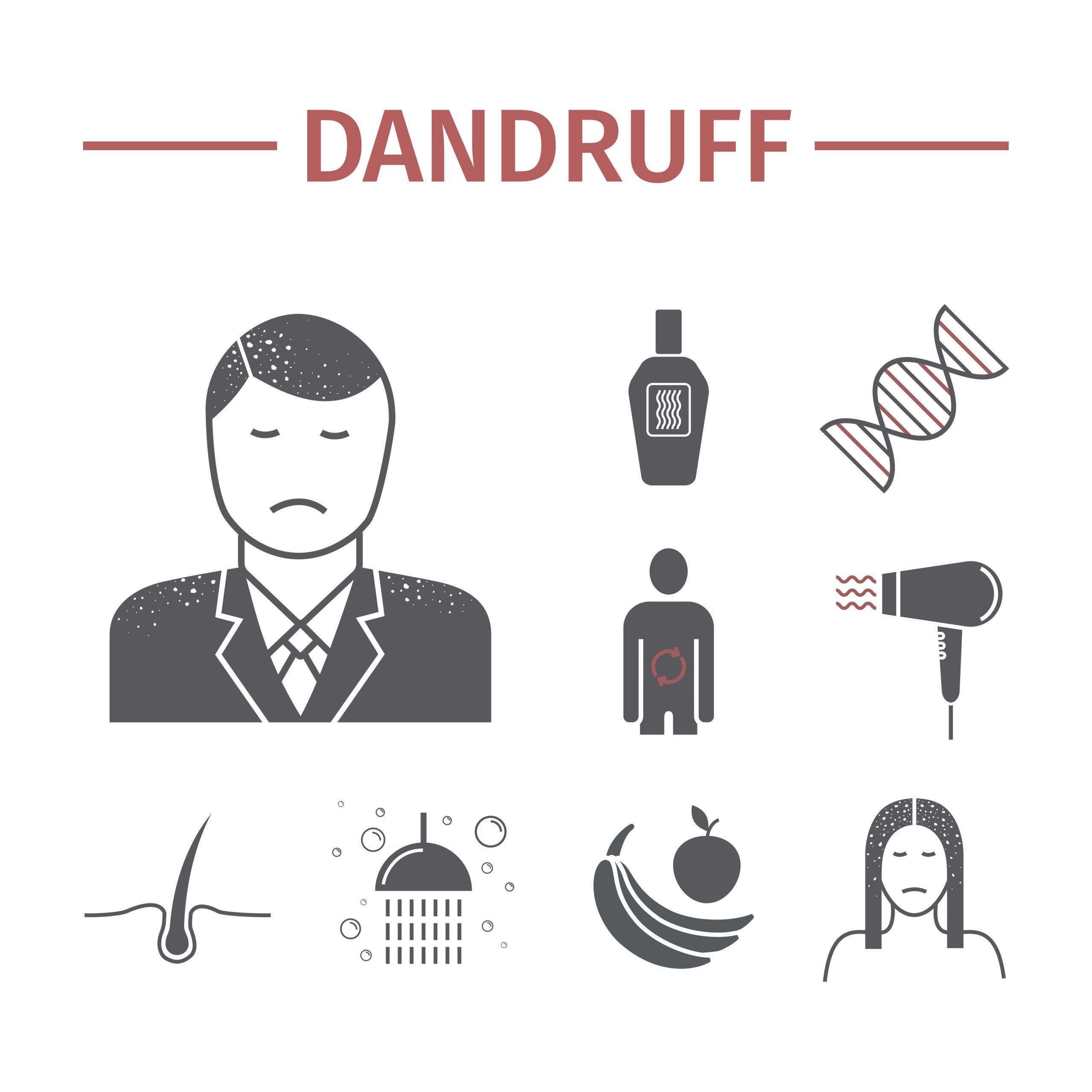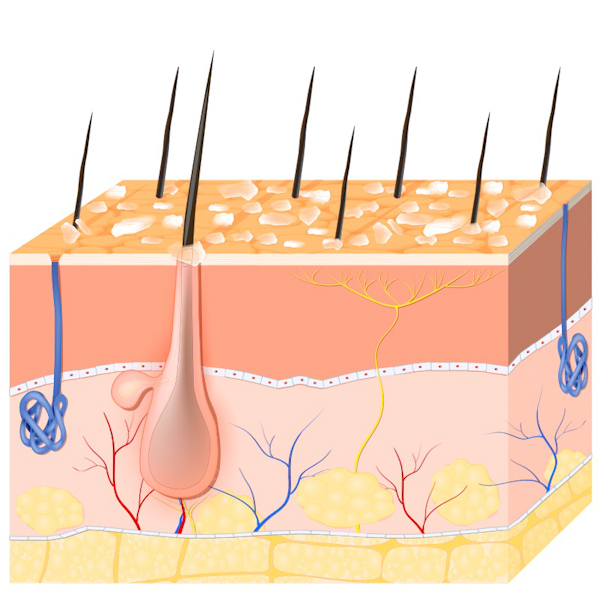
What Is Dandruff?
If you are suffering from dandruff, you are not alone. Around 70% of men are prone to this annoying scalp condition. So don’t panic if you groom your hair and find it sitting in your hairbrush or on your shoulders.
Dandruff is a skin condition that affects the scalp and leads to flaking and irritation of the skin. If really irritated, the scalp can appear red and you might experience an unpleasant tingling sensation. You might also feel and see greasy patches on the skin.
Another more extreme form of dandruff is known as seborrhoeic dermatitis, which can cause redness and manifest in other areas of the body.

Causes Of Dandruff
Dandruff basically occurs when the scalp is not exfoliated enough. Skin cells can be trapped on the surface and lead to the overproduction of cells which then flake off the scalp.
It is also due to a common yeast that can be found on our scalp called Malassezia. This fungus is natural and found in humans and animals. It is found on the scalp as it requires fat, which is in the natural oils in our skin to grow. We agree that it certainly doesn’t sound pleasant, but it isn’t something to be embarrassed about as so many of us have it without realising.
The exact cause of what leads to dandruff is still scientifically unproven, but it is thought that genetics, diet, and environmental factors can contribute to its manifestation. Stress can also have an effect on the condition of your scalp.
It is also worth noting that dandruff is not caused by dry skin or bad hygiene. Flaky scalp can be a sign of other conditions such as psoriasis, a fungal infection, eczema or even an allergic reaction.
Common Misconceptions About Dandruff
- You can cure dandruff:
Dandruff can’t actually be ‘cured‘ per se. If you are prone to it, you can certainly reduce its severity, but you can’t completely prevent it from occurring again. - Dandruff is contagious:
Dandruff is not contagious unless there is another more serious, underlying skin condition that shows symptoms of the same sort. - Dandruff occurs when your scalp is dry:
This is not true and dandruff is more likely to occur when your skin is oily. - Conditioners can make your dandruff situation better:
Everyday conditioners are made for your hair and not for your scalp. - You need to remove the flakes before shampooing:
You can cause further irritation and an increase in the production of flakes by doing this, as the skin tries to protect itself. - Dandruff causes hair loss:
Dandruff does not cause hair loss, but the action of constantly scratching your head can induce it. The loss of hair, while you have dandruff, can also be due to stress.

Treatments For Dandruff
As we mentioned earlier, there is no direct cure for dandruff. Unfortunately, it is something that will most likely reoccur, but is definitely controllable.
Shampoo
The obvious treatment for dandruff is anti-dandruff shampoo. If you are suffering badly from flaky scalp, it is recommended to use an anti-dandruff shampoo every day.
Not all anti-dandruff shampoos will work the same for everyone, so it is worth trying out one for a month (a skin cycle) and seeing if it works for you. If it is working (you should see a difference within a week or two) then you can start reducing the times you use it as needed.
When looking at anti-dandruff or medicated shampoos, look out for ones that contain zinc pyrithione (targets fungus and bacteria); ketoconazole (also targets fungus) which can be found in Nizoral shampoo; coal tar (slows down the growth of skin cells) or selenium disulphide (anti-fungal agent).
Some anti-dandruff shampoos can be very harsh on your skin and they can dry the scalp out completely. So it is best to do some research before buying a product.
You can also try using a silicone-free conditioner. This keeps your hair hydrated since it doesn’t contain the drying ingredient that is silicone, so your locks are soft and shiny throughout.
All in all, if you want to maintain a healthy scalp, wash at least three times a week to prevent the accumulation of oil and build-up of products.
Exfoliator
Exfoliating the scalp will help reduce the number of dead skin cells. But be careful, doing this regularly and scrubbing your scalp hard can cause irritation. You can use a massage scalp brush or an exfoliating product that you can easily find at a local drug store or pharmacy.

Brushing
Brushing your hair every day will help remove any pesky, unwanted flakes and most importantly, help maintain a healthy scalp. If you are suffering from dandruff, do not brush hard.
Use either a mixed bristle brush or a purely boar hair brush. The bristles will distribute oils evenly through the hair, whilst exfoliating the scalp.
Home Remedies
There are various home remedies you can try using on your scalp but be advised as they are not scientifically proven to get rid of dandruff. They are only short-term solutions for milder conditions:
- Raw honey – contains antiviral, anti-fungal and anti-inflammatory properties.
- Apple cider vingar – can help balance the pH of your scalp and also help stimulate the shedding of dead skin.
- Lemon and salt – also helps balance the pH while salt acts as an exfoliator.
- Tea tree oil – contains anti-microbial and anti-inflammatory properties.
- Baking soda – can act as a gentle exfoliator and prevents fungal growth.
Diet
A poor diet can lead to an unhealthy scalp. Eating plenty of omega fatty acids will help balance oil production in your skin and therefore improve hydration. They can also help relieve inflammation. You can either take a supplement or eat plenty of salmon, mackerel, chia seeds and walnuts.
Try to maintain a balanced diet and don’t eat too many greasy foods as this will increase the amount of oil secreted from your skin. The fungus, Malassezia, lives off this fat and can therefore multiply quickly.
Do I Need To Visit A Doctor?
A visit to the doctor isn’t really necessary if you have a mild case of dandruff. But if you aren’t sure what to do, a dermatologist will certainly be able to advise you on how to deal with your dandruff.
If you have tried an anti-fungal or anti-dandruff shampoo for a month and see no improvement, it might be time to visit a doctor. Also, if it is a severe case where your scalp is extremely itchy and irritated, a doctor will be able to prescribe you a stronger medication.
Other skin conditions can appear with similar symptoms to dandruff, so this is something you need to keep an eye on. Seborrhoea dermatitis, eczema and psoriasis should all be dealt with at your local GP.
























































